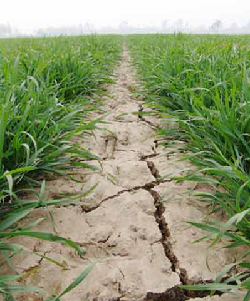
The northern region has been hit by the most severe drought in five years, a senior official with the State Flood Control and Drought Relief Headquarters said on March 27.
The drought has spread fast and many areas are facing challenges in releasing stored water to offset the shortage, Tian Yitang, deputy director of the headquarters, was quoted by the Xinhua News Agency as saying.
The drought is affecting all of the northeast as well as important cropland in the north and northwest. It has caused a drinking water shortage that has spread to 5.82 million residents and 5.43 million livestock, figures from the headquarters showed on Wednesday.
It also reported that about 19 million hectares of cropland nationwide had been severely affected, 4.67 million hectares more than during any drought in the past five years.
The State Council urged local governments to ensure a steady supply of drinking water in these areas and to keep a close eye on agriculture, particularly during the spring plowing season, Tian said.
Heilongjiang Province has already spent 737 million yuan (US$105 million) to combat the effects of the drought and ensure a bumper harvest, the Xinhua news agency reported yesterday.
The money was used to build or repair wells, dig small reservoirs, buy equipment, dredge canals and plow farmland, according to the provincial commission of agriculture.
Several factors are threatening to combine to worsen the effects of the drought there - scant rainfall, falling water tables and low water levels in rivers and many reservoirs.
Heilongjiang is China's largest supplier of commodity grains.
Apart from cash crops, maize, soybeans, rice and wheat are also grown there.
Almost 6 million hectares of arable land, more than 50 percent of the total sown area, could face a drought during the spring plowing season, which began last Thursday.
The provincial bureau of water resources said that precipitation was down about 50 percent from normal levels between November and March.
And it appears the drought has now spread to southern China.
Humid provinces such as Yunnan and Hainan have seen significant decreases in rainfall, according to the China Meteorological Administration.
Meteorologists attributed the conditions to the La Nina phenomenon and abnormal atmospheric circulation, which are set to prevail until the summer.
Don't miss:
Severe drought threatens crops in NE China
Heilongjiang Province faces drought
Over 500,000 short of drinking water in Liaoning
North China combats worsening drought
Drought continues in north, northeast China
(China Daily April 2, 2008)